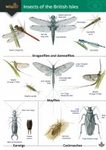By: Jeffery Keith Tomberlin(Editor), Mark Eric Benbow(Editor)
433 pages, 65 b/w photos and b/w illustrations, 17 tables
![Forensic Entomology Forensic Entomology]()
Click to have a closer look
About this book
Contents
Customer reviews
Biography
Related titles
About this book
This forensic entomology reference takes a global approach with case studies and contributions from six continents. Most of the research to date has been concentrated in Europe or North America. Traditional forensic entomology books have focused specifically on entomology as a field with very little mention of the other disciplines that influence forensic outcomes from an entomological prospective. Forensic Entomology bridges multiple disciplines including microbiology, chemistry, genetics, and systematics with forensic entomology. This groundbreaking book brings together hitherto largely ignored sources of previously unrelated new information in one place.
Contents
Introduction: A Global Perspective
- Global Perspectives and Challenges
- Current State of Forensic Entomology and Future Directions
- Asia (history, accomplishments & challenges)
- Europe (history, accomplishments & challenges)
- Africa
- Central & South America (history, accomplishments & challenges)
- North America (history, accomplishments & challenges)
Dimensions
- Experimental Design, Statistics & Computer Science
- Microbiology
- Chemistry
- Genetics
- Behavior
- Community Ecology
- Standard Practices
- Facilitating International Collaborations
The future
- Frontiers in Forensic Entomology
Customer Reviews
Biography
Dr. Jeffery Keith Tomberlin is an associate professor and co-director of the Forensic & Investigative Sciences Program and principal investigator of the Forensic Laboratory for Investigative Entomological Sciences (FLIES) facility at Texas A&M University. Research in the FLIES facility examines species interactions on ephemeral resources such as vertebrate carrion, decomposing plant material, and animal wastes to better understand the mechanisms regulating arthropod behavior related to arrival, colonization, and succession patterns. His research is also focused on waste management in confined animal facilities and the production of alternate protein sources for use as livestock, poultry, and aquaculture feed.
Dr. M. Eric Benbow is an assistant professor in the Departments of Entomology and Osteopathic Medical Specialties at the Michigan State University. The research in his laboratory focuses on microbial–invertebrate community interactions in aquatic ecosystems, disease systems, and carrion ecology and evolution. All of these research foci use basic science to inform applications in forensics. He is regularly invited as a speaker at international and national academic meetings related to forensic entomology and has led workshops at the international level discussing experimental design, statistical analyses, and the importance of novel basic ecological concepts in advancing the field of forensic entomology.
By: Jeffery Keith Tomberlin(Editor), Mark Eric Benbow(Editor)
433 pages, 65 b/w photos and b/w illustrations, 17 tables









































